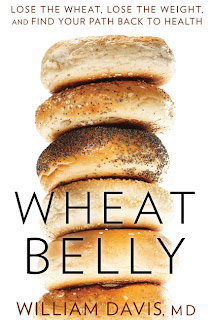As you may have read in earlier posts, despite the fact that it didn't show up as a sensitivity via weight gain (when I was doing the Elimination Diet from the Six Secrets of Successful Weight Loss), my continuing reflections led me to the idea of removing wheat from my diet, just to see. For a couple of weeks I ate very little wheat, no cereal or toast in the morning, no pasta etc, but I did have little bits here and there if I was out, and when my mum brought round a pastry tart!
I felt significantly better for the wheat reduction and decided to go the whole hog and try 4 weeks of being totally wheat free, just to see what would happen.
I ended up buying the Wheat Belly Book and this has been occupying me for most of the week. If you ever need the motivation to try being totally wheat free then this is it. For me, the idea of never eating any wheat again is really rather an unpleasant thought. I love wheat, it's in lots of really yummy things, and living with out it sounds darn right inconvenient!
The book however has lots of compelling arguments as to why everyone should stop eating wheat, not just people that are sensitive to it. The author, William Davis, says that he could have called his book a number of things, pretzel brain and bagel bowel being two of his options, as he claims that there is not a single organ system in your body that is unaffected by wheat.
He talks about how historically, our consumption of grains changed as we moved from a hunter-gatherer culture to the farming of grains. He then talks about how wheat itself has changed through the process of selection and genetic engineering for a better crop. The wheat we eat today has three times as many chromosomes as the wheat we ate 50 years ago, this has changed the biochemistry of the grain significantly, which Davis believes is having an effect on our health.
There are lots of reasons not to eat wheat discussed in the book. I didn't realise, but apparently whole grain bread has a higher GI that table sugar. Davis blames wheat for the accumulation of the unhealthy fat around our waists, which is a result of the good sugar spike wheat causes. Thus wheat is responsible for diabetes and insulin resistance.
He also states that wheat is addictive, that it binds to the same receptors in the human brain as heroin and other opiates, and can be blocked by the same drugs used to bring addicts down when they are hospitalised. Eating wheat gives you a kind of high, and when it wears off, you crave more wheat. People who eliminate wheat (or take the drugs that block it from binding with opiate receptors) are therefore less hungry and eat on average 300-400 calories less per day.
Wheat is also the guilty party in celiac disease. Davis claims that there are varying levels of this disease, and the markers usually tested for may not always show the risk a person faces from wheat. Many people not diagnosed with celiac will therefore suffer from bowel and intestinal problems as a result of eating wheat.
He also talks about wheat and the formation of small particle LDL cholesterol, which is a major factor in heart disease.
And then there is the effects on the skin, and joints, and brain...
In all, the book paints a sinister picture of nasty beast that you wouldn't want anywhere near you. As I said, this was the final push I needed to at least give it a try.
It's not just about dropping wheat though. What you replace it with is also important. Davis warns against using 'gluten free' products to replace all of your current wheat consumption, as these are made from highly refined carbs and will have a similar effect on your blood sugar. Instead he recommends:
eat as much as you like of
- vegetables
- nuts
- oils
- meat
- eggs
- cheese
- non sugary condiments
- and other things like avocado, olives and cocoa
- milk, yoghurt, butter
- fruit
- corn
- other grains
- legumes
- soy
- wheat
- hydrogenated fats
- 'gluten free' foods
- dried fruit
- fried foods
- sugary foods










No comments:
Post a Comment